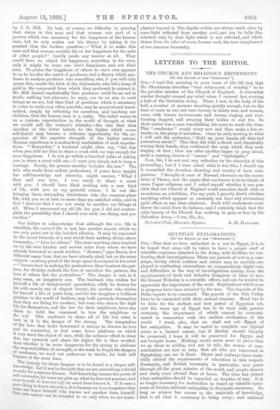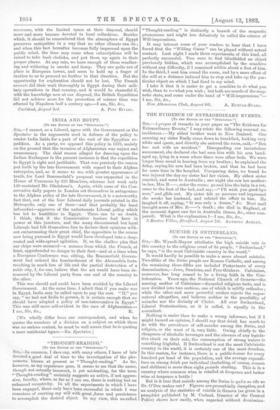EGYPTIAN EXPLORATIONS.
(TO THE EDITOR OF THE " 10E01'41.1'0R:1 Sin,—Now that we have embarked in a war in Egypt, it is to be hoped that steps will be taken to have a proper staff of scientific explorers attached to the Army, with facilities for con- ducting their investigations. There are periods of rest in a cam- paign, during which soldiers and others may be usefully em- ployed in conducting excavations at comparatively slight cost, and difficulties in the way of investigations arising from the requirements of trade and industry disappear in time of war. Sir Garnet Wolseley is a scientific officer, and can be trusted to appreciate the importance of the work. Explorations which were in progress have been arrested by the war. The deposits of the Delta require to be examined. The gravels of the Nile Valley have to be connected with their animal remains. Much has to be done for the earliest and best period of Egyptian art, and the stone age of Egypt has to be fixed with greater certainty, the importance of which cannot be over-esti- mated in connection with the earliest civilisation of the world. I trust, also, that we shall not rob Egypt of her antiquities. It may be useful to complete our typical series to a limited extent, but if Boulak should happily be preserved, I hope it will be preserved for Egypt, and not brought home. Nothing would serve more to prove that we go there to civilise, and not to rob; the means of com- munication are now so easy, that all who are interested in Egyptology can see it there. Steam and railways have mate- rially altered the requirements of education in this respect- Humanity, and British humanity in particular, now pours through all the great arteries of the world, and people observe and study more abroad than at home. The time has passed when antiquities should be regarded as trophies of war. It is no longer necessary for instruction to hoard up valuable speci- mens of foreign national antiquities in European museums. So long as science has access to the materials of knowledge, that is all that is necessary to bring away ; and national museums, with the limited space at their disposal, should more and more become devoted to local collections. Besides which, it should be remembered that the atmosphere of Egypt preserves antiquities in a way that no other climate can do ; and when this fact hereafter becomes fully impressed upon the public mind, the time may come when subscriptions will be raised to take back obelisks, and put them up again in their proper places. At any rate, we have enough of them weather- ing and withering in smoke and damp. They are quite out of place in European towns, and seem to hold up a finger of caution to us to proceed no further in that direction. But the opportunity for exploration should not be lost. The French savants did their work thoroughly in Egypt during their mili- tary operations in that country, and it would be shameful if, with the knowledge now at our disposal, the British Expedition did not achieve more for the promotion of science than was effected by Napoleon half a century ago.—I am, Sir, &c.,































 Previous page
Previous page